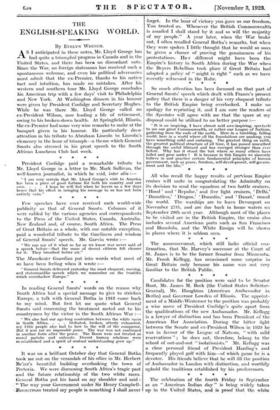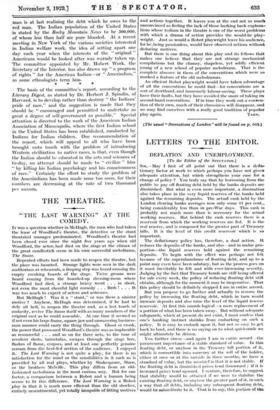THE
ENGLISH-SPEAKING WORLD.
By EVELYN WRENCH.
AS I anticipated in these notes, Mr. Lloyd George has had quite a triumphal progress in Canada and in the United States, and there has beek no discordant note. Since the War, no foreign statesman has received such a spontaneous welcome, and even his political adversaries must admit that the ex-Premier, thanks to his native tact and intuition, has made no mistakes. After his western and southern tour Mr. Lloyd George concludes his American trip with a few days' visit to Philadelphia and New York. At Washington dinners in his honour were given by President Coolidge and Secretary Hughes. While he was there Mr. Lloyd George called on ex-President Wilson, now leading a life of retirement, owing to his broken-down health. At Springfield, Illinois, the ex-Premier had some very wise remarks to make at the banquet given in his honour. He particularly drew attention in his tribute to Abraham Lincoln to Lincoln's clemency in the hour of triumph—a theme which General Smuts also stressed in his great speech to the South African Luncheon Club last week.
President Coolidge paid a remarkable tribute to Mr. Lloyd George in a letter to Mr. Mark Sullivan, the well-known journalist, in which he said, inter alia "I am very certain that Mr. Lloyd George's visit to America has been a piece of good fortune for both his country and our own. . . . I hope he will feel when he leaves us a few days hence that his effort in bringing his message to us has not been entirely vain."
Few speeches have ever received such world-wide publicity as that of General Smuts. Columns of it were cabled by the various agencies and correspondents to the Press of the United States, Canada, Australia, New Zealand and, of course, South Africa. The Press of Great Britain as a whole, with one notable exception, paid a wonderful tribute to the timeliness and wisdom of General Smuts' speech. Mr. Garvin wrote :- "We can say of it what so far as we know was never said of a speech before—that the mass of decent citizens felt cleaner for it. They breathed better air."
The Manchester Guardian put into words what most of us have been feeling when it wrote :— " General Smuts delivered yesterday the most eloquent, moving, and statesmanlike speech which we remember on the troubles which overshadow Europe."
In reading General Smuts' words on the reason why South Africa had a special message to give to stricken Europe, a talk with General Botha in 1913 came back to my mind. But first let me quote what General Smuts said concerning the treatment meted out to his countrymen by the victor in the South* African War :— " We also luid our age-long contention between the white races in South Africa. . . . Defeated, broken, utterly exhausted, my little people also had to bow to the will of the conqueror. But it was not an impossible peace. The war was not continued in another form after the peace. The Boers were not treated as moriLl pariahs and outcasts. Decent human relations were re-established and a spirit of mutual understanding grew up."
It was on a brilliant October day that General Botha took me out on the verandah of his office in Mr. Herbert IVIer's beautiful building overlooking the town of Pretoria. We were discussing South Africa's tragic past and the future relationship of the two white races. General Botha put his hand on my shoulder and said : . "The way your Government under Sir Henry Campbell- - 13annerman treated thy people is something I shall never forget. In the hour of victory you gave us our freedom. You trusted us. Whenever the British Commonwealth is assailed I shall stand by it and so will the majority of my people." A year later, when the War broke out, I often recalled General Botha,'s remarks, but when they were spoken I little thought that he would so soon be given a chance of proving the genuineness of his protestations. HON different might have been the Empire's history in South Africa during the War when the Beyers Rebellion took place if Great Britain had adopted a policy of "might is right" such as we have recently witnessed in the Ruhr.
So much attention has been focussed on that part of General Smuts' speech which dealt with France's present policy that there is a danger of his very eloquent tribute to the British Empire being overlooked. I make no apology for reprinting it, and I am sure the readers of the Spectator will agree with me that the space at my disposal could be utilized to no better purpose :— "It is an inspiring, I have almost said awe-inspiring, spectacle to see our great Commonwealth, or rather our League of Nations, gathering from the ends of the earth. Here in a tumbling, falling world, here in a world where all the foundations are quaking, you have something solid and enduring. The greatest thing on earth, the greatest political structure of all time, it has passed unscathed through the awful blizzard and has emerged stronger than ever before. Why has it stood the test where so many others have failed and gone under ? It is because in this Empire we sincerely believe in and practice certain fundamental principles of human government, such as peace, freedom, self-development, self-govern- ment and the like." • All who recall the happy results of previous Empire cruises will unite in congratulating the Admiralty on its decision to send the squadron of two battle cruisers, ' Hood ' and 'Repulse,' and five light cruisers, ' Dauntless," Dragon," Dunedin,' and Dame,' round the world. The warships. are to leave Devonport on November 27th, and are due back in home waters on September 28th next year. Although most of the places to be visited arc in the British Empire, the cruise also includes several American ports such as San Francisco and Honolulu, and the White Ensign will be shown in places where it is seldom seen.
The announcement, which still lacks official con- firmation, that Mr. Harvey's successor at the Court of St. James is to be the former Senator from Minnesota, Mr. Frank Kellogg, has occasioned some surprise in Great Britain only because his name was not very familiar to the British Public.
- * Candidates for the position were said to be Senatof Root, Mr. James M. Beck (the United States Solicitor- General), Mr. Houghton (American Ambassador in Berlin) and Governor Lowden of Illinois. The appoint- ment of a Middle-Westerner to the position was probably a wise move of President Coolidge's quite apart from the qualifications of the new Ambassador. Mr. Kellogg is a lawyer of distinction and has been President of the American Bar Association. During the bitter light between the Senate and ex-President Wilson in 1920 he was in favour of the League of Nations, "with mild reservations" ; he does not, therefore, belong to the school of out-and-out "isolationists." Mr. Kellogg was a close personal friend of President Harding's and frequently played golf with him—of which game he is a devotee. His friends believe that he will fill the position of Ambassador in London with distinction, and worthily uphold the traditions established by his predecessors.
The celebration of the fourth Friday in September as an "American Indian day" is being widely taken up in the United States, and is proof that the white . . _ man is at last realizing the debt which he owes to the red inan. The Indian population of the United States -is stated by the Rocky Mountain News to be 500,000, of whom less than half are pure blooded. At a recent meeting in New York of the various societies interested in Indian welfare work, the idea of setting apart one day each year when the interests of the " original " Americans would be looked after was warmly taken up. The committee appointed by Mr. Hubert Work, the Secretary of the Interior, has also drawn up "a program of rights" for the American Indian—or "Amerindian," as some ethnologists term him.
, The basis of the committee's report, according to the Literary Digest, as stated by Dr. Herbert J. Spindin, of Harvard, is to develop rather than destroy "the Indians' pride of race," and the suggestion is made that they should be "encouraged and permitted to undertake as great a degree of self-government as possible." Special attention is directed to the work of the American Indian Association of Minneapolis, where the first Indian school in the United States has been established, conducted by Indians for Indian children. One recommendation of the report, which will appeal to all who have been brought unto touch with the problem of introducing . Western civilization to native races, is that, even though the Indian should be educated in the arts and sciences of to-day, no attempt should be made to " civilize " him "by killing his Indian psychology and his consciousness of race." Certainly the effort to study the problem of the Amerindians has been made none too soon, for their numbers are decreasing at the rate of two thousand per annum.



























































 Previous page
Previous page